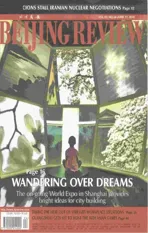Mixed Reactions
2010-12-27PENGSONG
Mixed Reactions
UN Secretary General Ban Kimoon, while welcoming the diplomatic efforts by Turkey and Brazil, reiterated his call to Iran to show greater transparency on the nuclear fuel swap deal. He said the Iranian proposal would be assessed by all concerned parties and, if accepted, could serve as an important confdence-building measure and pave the way for a negotiated solution to the Iranian nuclear dispute.
The EU expressed skepticism and cast doubt on whether Iran’s latest concession would answer all concerns. “We are seriously concerned about Iran’s nuclear program,”said EU President Herman Van Rompuy.“Iran has so far refused to engage in serious discussions on reasonable concerns related to its nuclear program. Iran needs to reassure the international community about the intentions behind its nuclear program.”
French Foreign Ministry spokesman Bernard Valero said the deal did not resolve the underlying dispute over Tehran’s nuclear program. He said the agreement was“necessary” but “would in no way resolve the problem posed by the Iranian nuclear program,” citing “constant violations” of UN Security Council resolutions by Iran.
British Foreign Office official Alistair Burt said Britain would work for a new sanction resolution—which was passed by the UN Security Council on June 9—until Iran“takes concrete actions” to meet its obligations to the International Atomic Energy Agency.
Russia welcomed the deal. Russian Foreign Minister Sergey Lavrov said in a televised speech, “If fully implemented, it will create very important preconditions not just for the solution of the concrete problem...but for improving the atmosphere for the renewal of negotiations.”
Russia’s support is not without conditions. “There are no 100 percent guarantees,” Lavrov added. “Very much will depend on how Iran will approach its commitments. If it strictly abides by them, Russia will actively support the scheme proposed by Brazil and Turkey.”
Russia’s attitude, including its support for the U.S.-led Security Council draft resolution, has angered Iran. Relations between the two long-term friends suddenly turned sour. On May 26, Iranian President Mahmoud Ahmadinejad said Russia’s position could turn it into an enemy of the Iranian people. The following day, Lavrov responded to the criticism, saying the remark “is being interpreted as emotional.”
The most negative response, unsurprisingly, came from the United States. Secretary of State Hillary Clinton told the U.S. Senate Foreign Relations Committee that“there are a number of unanswered questions regarding the announcement coming from Tehran.”
China maintained its long-standing position. Chinese Foreign Minister Yang Jiechi said, “China has noted the reports and expresses its welcome and appreciation for the diplomatic efforts all parties have made to positively seek an appropriate solution to the Iranian nuclear issue.” Chinese Foreign Ministry spokesman Ma Zhaoxu further said China hoped the nuclear fuel swap agreement“will beneft the process of peacefully resolving the Iranian nuclear issue through dialogue and negotiations.”
After the adoption of UN Security Council Resolution 1929, which imposed new sanctions on Iran, Ambassador Li Baodong, China’s Permanent Representative to the UN, said,“China hopes that countries concerned will...strengthen contact and dialogue, foster mutual trust, dispel misgivings, address each other’s concerns, and seek a solution acceptable to all parties to restart negotiations.”
(By PENG SONG)
